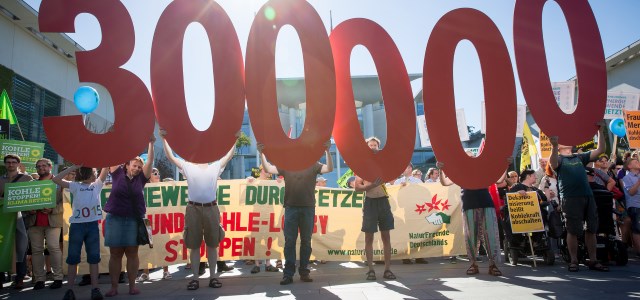The plan to implement a sort of national carbon emissions trading scheme specifically to clamp down on electricity from lignite is now officially dead. Last night, the German government adopted a different plan with a broader focus. Aside from the coal sector, no one seems to like it. Craig Morris investigates.

300.000 signatures for a coal phase-out and a number of protests didn’t help: The German government gave in to coal interests. (Photo by Christian Mang / Campact, CC BY-NC 2.0)
Over the past few weeks, I have spared my readers the details. After all, Clean Energy Wire published its own blow-by-blow account of the debate. Suffice it to say that an affordable, effective, and politically elegant proposal met with opposition from some unions and industry, and they got their way. If you want to hear what the bitter complaining in the German debate sounded like, I refer you to Lily Fuhr’s recent post in our blog.
Here is an overview of the new deal reached last night, which includes several agreements more or less related to coal power:
- 2.7 GW of lignite plants are to be taken out of the power market and put into a capacity reserve.
- Because that agreement alone will not allow Germany to reach its carbon reduction target for 2020, more than 1 billion euros annually is to be provided additionally for energy efficiency (specifically, cogeneration and heat pumps)
- Nuclear plant operators are to be held accountable for nuclear waste disposal.
- Grid expansions are to proceed. Bavaria has been blocking progress here, so the focus will be on better use of existing power lines, and more underground cables are to be used instead of overhead lines where there is public resistance.
Each of these items would require its own blog post to explain, so follow the links provided for the nuclear and grid items. Below, I focus on coal power.
Greenpeace’s Tobias Münchmeyer reacted to the announced deal by reminding Chancellor Merkel of her promise at the G7 Summit four weeks ago to step away from coal. Now, coal plants taken off the wholesale market and essentially given a golden parachute – they will be paid to remain on standby. In a paper published 10 days ago, Germany’s leading economics Institute DIW calculated (PDF in German) that the proposal to shut down 2.7 GW of lignite plants – basically the deal reached – would be more expensive and reduce carbon emissions less than the climate levy successfully blocked by the IG BCE, the labor union representing the sectors of mining, chemicals, and energy. In fact, the economists found that emission reductions from the coal reserve were as low as a tenth of what the climate levy would have ensured – hence the need for all of the other actions.
The government apparently not only ignored its top economists, but also its top environmental policy advisers. A month ago, the SRU published (PDF in German) “10 theses on the future of coal up to 2040.” The first one is crucial: we have to leave most of our fossil resources in the ground, and Germany’s tremendous lignite resources (which could theoretically cover a quarter of power demand for the next century or two) will be the German contribution to global divestment. In other words, we need to focus not only on what we burn, but what we dig up.
The SRU also points out that fluctuating wind and solar require flexible backup generation, not baseload (which old lignite plants are). Furthermore, the “national emissions trading platform” that the climate levy would have created could have prevented the “waterbed effect” – when emissions reduced in one country are simply shifted elsewhere. With the climate levy, Germany might have thrown away emission allocations rather than make them available elsewhere.
Carsten Pfeiffer of the renewable energy association BEE says, however, that there is some good news: “Last night’s agreement also buried the capacity market idea called for by leading German utility groups.” (Though the devil is in the detail – from a layman’s perspective, the capacity reserve is essentially just a small capacity market.)
As of this morning, all of the details remained unclear, including which lignite plants would be shut down. As difficult as it must be for a Social Democrat – the party of unionists – to stand up to a large labor union, frankly, this deal is a missed opportunity to open the door to a coal phaseout. Sorry, Minister Gabriel, it’s just not enough.
Craig Morris (@PPchef) is the lead author of German Energy Transition. He directs Petite Planète and writes every workday for Renewables International.